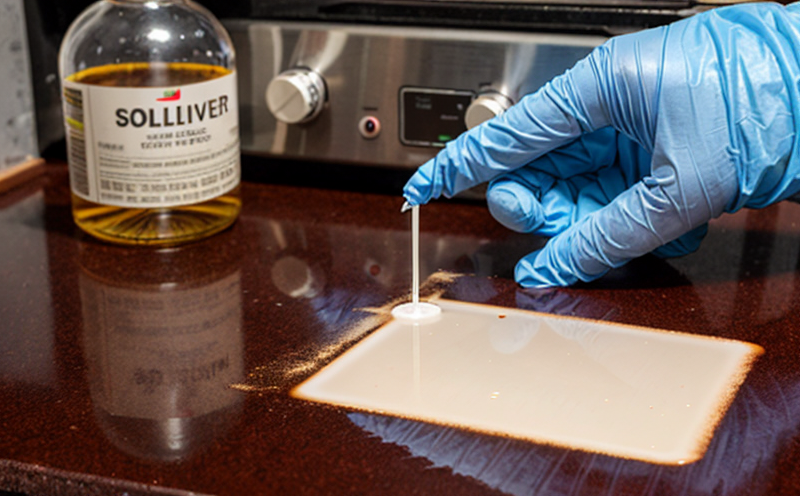Air Filter Solvent Residue Testing
When it comes to ensuring the safety and efficiency of air filtration systems in industrial settings, one critical aspect is the presence of solvent residues. These residues can significantly impact filter performance, leading to reduced airflow, increased pressure drop, and potential contamination downstream. Air filter solvent residue testing is a specialized procedure that assesses the quantity of solvents retained within the fibers or media of an air filter.
This test is essential for several reasons:
- To ensure compliance with international standards such as ISO 16890 and EN 13782, which dictate specific performance criteria for HVAC filters.
- To provide peace of mind to quality managers responsible for maintaining the integrity of air filtration systems.
- To assist R&D engineers in optimizing filter design and material selection.
The process involves collecting samples from the air filters, which are then analyzed using techniques such as gas chromatography (GC) or Fourier transform infrared spectroscopy (FTIR). The goal is to quantify any residual solvents that may have migrated into the filter during manufacturing. This helps in identifying potential sources of contamination and ensuring that only pure materials are used.
Understanding the composition and concentration levels of these residues can help quality assurance teams make informed decisions about filter replacement schedules, thereby extending the life of the filtration system. Moreover, this testing is crucial for compliance with regulatory requirements, especially in industries like pharmaceuticals and electronics manufacturing where purity standards are stringent.
The test results provide valuable insights into the performance characteristics of the filters, enabling procurement teams to select suppliers who adhere strictly to quality control measures. This not only enhances operational efficiency but also contributes to a safer working environment by minimizing risks associated with airborne contaminants.
Given its importance in ensuring optimal air quality and compliance with industry standards, this test is widely used across various sectors including healthcare facilities, industrial manufacturing plants, laboratories, and cleanrooms. By adhering to stringent testing protocols, organizations can maintain high levels of product purity and worker safety.
Benefits
The benefits of conducting air filter solvent residue testing extend beyond mere compliance with regulations; they encompass improved operational efficiency and enhanced occupational health and safety. Here’s how it translates into tangible advantages:
- Enhanced Filter Performance: By eliminating solvents that could interfere with the filter's function, the overall performance is optimized.
- Cost Savings: Regular testing helps in identifying issues early on, preventing costly repairs or replacements of filters.
- Improved Compliance: Ensures adherence to national and international standards like ISO 16890 and EN 13782, avoiding potential legal penalties.
- Better Worker Safety: Reducing airborne contaminants minimizes health risks for employees working in sensitive environments.
Incorporating this testing into your regular maintenance routine can lead to substantial long-term savings while promoting a safer and more efficient work environment.
Industry Applications
- Hospitality Industry: Ensuring air quality in hotels, restaurants, and other hospitality venues is paramount for maintaining customer satisfaction and health standards.
- Reduces the risk of respiratory infections among patrons by filtering out harmful particles.
- Improves guest comfort through better temperature regulation due to efficient filters.
- Avoids cross-contamination by ensuring that no residues from previous batches are carried over into new ones.
- Enhances the precision of manufacturing processes by maintaining stable working conditions.
Why Choose This Test
Selecting air filter solvent residue testing is a strategic decision that offers multiple advantages over other methods. Here’s why this particular test stands out:
- High Accuracy: Utilizing advanced analytical techniques ensures precise measurement of even trace amounts of solvents.
- Comprehensive Analysis: The test covers a wide range of solvent types, providing a holistic view of the filter's condition.
- Regulatory Compliance: Meeting stringent international standards helps avoid non-compliance issues and associated fines.
- Precision in Selection: Enables procurement teams to choose suppliers who meet rigorous quality criteria.





